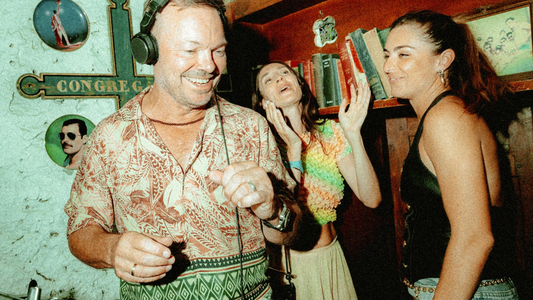
Jorge Ben – África Brasil (1976)
By Rafi Mercer
The first thing you notice is the guitar: sharp, rhythmic, choppy, almost percussive. Then comes the groove — bass deep and buoyant, drums steady but elastic — before Jorge Ben’s voice enters, playful, melodic, filled with charisma. This is África Brasil, released in 1976, an album that electrified Brazilian popular music by fusing samba with funk, and one that still vibrates with joy, invention, and cultural pride.
Jorge Ben had already been a major figure in Brazilian music for more than a decade. His 1963 debut, Samba Esquema Novo, had introduced his unique guitar style — part rhythm, part harmony, percussive and melodic at once. By the mid-1970s, Brazil’s musical landscape was shifting. Funk and soul from the United States were reshaping global sound, and Ben embraced these influences without abandoning samba. África Brasil was the result: an album that electrified his music, literally, with the switch from acoustic to electric guitar, and figuratively, with grooves that felt like current running through the body.
The album opens with “Ponta de Lança Africano (Umbabarauma),” a tribute to football as cultural passion and metaphor. The rhythm is irresistible, the guitars jagged, the horns triumphant. It is both celebratory and serious, linking sport to identity and pride. “O Plebeu” follows, a reworking of a classic samba with funk intensity, demonstrating Ben’s gift for bridging tradition and innovation.
“Xica da Silva” tells the story of an eighteenth-century Afro-Brazilian woman who rose from slavery to wealth and power, her tale sung over a groove that is both playful and defiant. “A História de Jorge” is autobiographical, self-mythologising with humour and swagger. “O Filósofo” swings with funk sophistication, while “Hermes Trismegisto Escreveu” invokes mysticism with cosmic groove.
Perhaps the most famous track is “Taj Mahal,” originally recorded acoustically in 1972 but here transformed into an electric funk anthem. Its chant-like refrain — later infamously echoed in Rod Stewart’s “Da Ya Think I’m Sexy?” — is infectious, celebratory, unstoppable. Throughout, Ben’s voice is casual but commanding, his delivery conversational yet melodic, his charisma filling every groove.
What makes África Brasil extraordinary is its synthesis. The electric guitar becomes percussion, the samba rhythm becomes funk groove, the funk bass becomes samba heartbeat. The album feels both deeply Brazilian and globally resonant. It celebrates African heritage, embraces modernity, and invites everyone into the dance.
Culturally, the album was transformative. It signalled a new era of samba-funk fusion, influencing generations of Brazilian musicians. It also asserted Afro-Brazilian identity with confidence, its title and songs embracing heritage at a time when racial pride movements were gaining momentum worldwide. In Brazil, still under military dictatorship, such affirmations carried political weight. Internationally, the record became a cult classic, revered by DJs, collectors, and musicians across genres.
Listening today, the album remains joyous and welcoming. Its grooves are infectious, its melodies unforgettable. You do not need to know Portuguese to feel it. You do not need to understand samba’s intricacies to move with it. Its inclusivity is immediate: women and men, young and old, Brazilian and global audiences alike, all find themselves embraced by its rhythm. It is music that creates community, not hierarchy.
On vinyl, the record is radiant. The warmth of the pressing amplifies the bass, the guitars crackle with energy, the horns blaze with colour. The surface crackle blends with the funk grit, making it feel even more alive. The cover — Ben, shirtless, holding his electric guitar like a weapon of groove — captures the album’s spirit perfectly: proud, powerful, uncontainable.
Nearly fifty years on, África Brasil remains a cornerstone not only of Brazilian music but of global listening culture. It is a record that bridges continents, genres, traditions. It shows that samba can funk, that funk can samba, that rhythm itself is borderless. It proves that joy can be political, that groove can be liberation, that a guitar riff can carry a people’s pride.
To play it now is to feel that current still flowing. The guitars slash, the bass dances, the horns declare, the voice smiles. And you realise that África Brasil is not just an album. It is a celebration, a liberation, a groove that refuses to end.
Rafi Mercer writes about the spaces where music matters. For more stories from Tracks & Tales, subscribe, or click here to read more.







